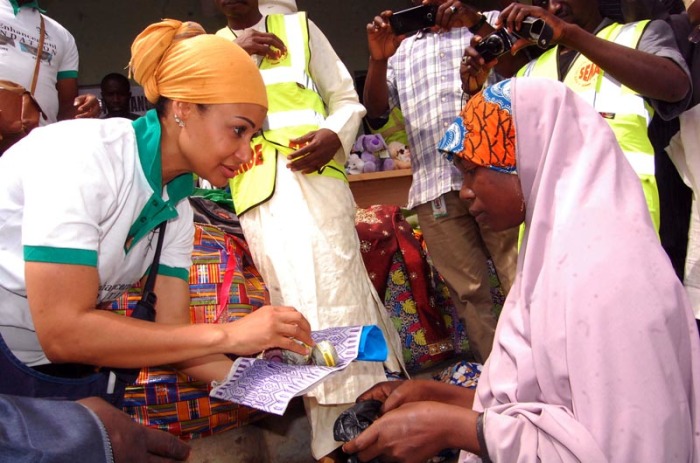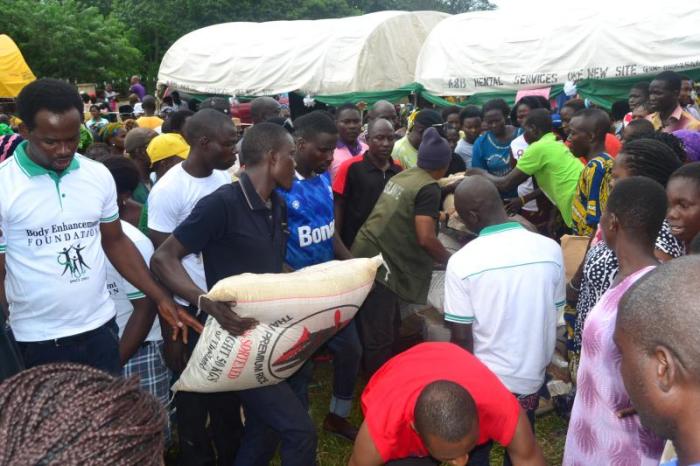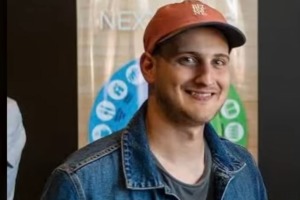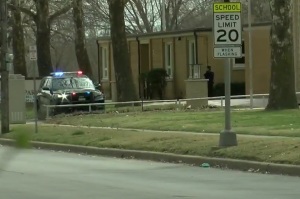Princess Modupe Ozolua Calls on International Community to Join Her in Helping Boko Haram Victims Rebuild Their Lives (Interview)
BringBackOurGirls Campaign Raised Awareness but Help Is Also Needed for the Thousands of Others Affected by Boko Haram

Princess Modupe Ozolua, an entrepreneur and philanthropist from the royal family of the Benin Kingdom in Edo State, Nigeria, has called on the international community to get involved in a project seeking to help the victims of Boko Haram rebuild their lives.
Ozolua said that campaigns such as BringBackOurGirls have been good for raising awareness on the issue, but argued that the thousands of women and children affected by Boko Haram also need help, not just the kidnapped Chibok girls.
"What is most important for people to understand is that this is a very serious issue. These are men, women and children. When we go to the camps, and see everyone crying, we think 'Oh God, this is such a mess.' But the truth is it can happen to anybody," Ozolua told The Christian Post in a phone interview on Tuesday.
You have these people who have just lost everything, who have witnessed their families being killed before their eyes. They have lost every means of dignity, everything they knew."
Ozolua serves as the CEO of the Body Enhancement Foundation, which helps restore lives of underprivileged people in Africa through modern medicine, education, self-empowerment, rehabilitation programs and food drives.
Her latest campaign is seeking to provide real means for victims of Boko Haram to get back on their feet and start rebuilding their lives, and as part of the cause has started a GoFundme page where people can donate money.
Nearly 700 hostages were rescued from Boko Haram in the past few weeks following raids by the Nigerian army in the Sambisa forest, while thousands of women and children have suffered due to the terror group.
The Islamic militants have been carrying out attacks in Nigeria since 2009, and have kidnapped large groups of women and children on a number of occasions.
The greatest international attention has fallen on a group of over 200 schoolgirls kidnapped from a school in Chibok in April 2014, which sparked the BringBackOurGirls social media campaign.
Ozolua told CP that although the campaign was good at raising awareness for the issue, often times international news coverage fails to reflect that the Chibok girls are only a small number of all the women and children that have been taken by Boko Haram in Nigeria.
"It's great that the BringBackOurGirls campaign raised awareness for the Chibok girls, but the negative effect was that it drew attention away from every other person — and you have over 1.5 million people that have been displaced," she said.
"That's not the intention of the BringBackOurGirls campaign of course, but that's what happened."
Nearly 200 girls and 93 women were rescued in the Sambisa forest in April following a rescue raid, but media attention failed to point out that they are not the Chibok girls kidnapped last year.
"What about all the others who don't end up in the papers? Even in the camps you have people from Chibok — you have people from all over the northeastern area of Nigeria that have lost everything," Ozolua said.
The Body Enhancement Foundation CEO added that it's unfortunate that some people are only interested in taking pictures or hearing stories about the victims of Boko Haram at the rescue camps, but are not willing to help out in a meaningful way.
She said that a major problem is that after the victims are rescued and checked out at hospitals, they are usually sent back to the camps, where there is little in the way of a future for them.
"We are the only ones talking about this in Nigeria. We're giving them money, helping them acquire farmland, making sure they have all they need so they can start being able to fend for themselves," Ozolua continued.
"We are focusing on the women, helping them get the machinery or whatever it is that they need to be able to start earning a living. The truth is, every woman is responsible for her kids, whether she is married or not. Those who don't have any skills, we put them through an educational or a training program — and in turn they can also understand the importance of being self-reliant, and put their kids through school."

She highlighted that it is crucial for children to go back to school, and for the schools to be rebuilt.
"Education for the children is very important, because when a child is educated and has a purpose and a goal in life, they are hopefully less likely to want to join a terrorist group and commit crimes. They are less likely to be brainwashed and find reasons to go kill the next person."
Ozolua said that her organization has been active in Africa since 2003, and has been offering free reconstructive surgery to people in need.
"We started with a huge medical mission, pretty much anybody that showed up where we operated the missions was treated for free. Along the way we started doing food drives because of the great deal of poverty here," she said.
"Early on this year, we became involved with the victims, with the survivors of Boko Haram, because it is a major issue. Personally, I think that everybody should be involved in helping the survivors."
Ozolua highlighted that although government officials provide relief to the victims in terms of food and other necessities, a real plan for getting people back on their feet is needed.
"Of course they need [those supplies], but it's beyond that. That is not going to re-integrate them into society. It's not going to help them rebuild their lives. We should look at tackling the problem from the grassroots, and look at self-improvement. Which means helping these people regain some dignity through self-empowerment, and enable them to start earning income, so they can get themselves out of those camps."
Boko Haram militants have been pushed back by the army from their previously held bases in the past several months, a trend which has coincided with the election of Nigeria's next president, retired General Muhammadu Buhari.
Buhari has vowed to take a hard stand on Boko Haram and eradicate the terror group from the country, which is a hope most Nigerians share, Ozolua said.
"I think we all generally share the same feeling that General Buhari will sort things out. He is a disciplinarian, and he has a background in the army. His hope is that he will be able to hold the Nigerian army responsible and get to explain why this [war] got so far in the first place."
She said she is skeptical about Boko Haram disappearing completely, however, especially in light of the militants pledging their allegiance to terror group ISIS, which is active in Iraq and Syria.
"Are they going to disappear completely? Personally, I think they are going to regroup, and so it will be a question of minimizing their activities. We are very hopeful, because too many lives have been lost, and too much has been compromised."
Ozolua noted that the government is saying it's winning the war and is encouraging people to go back to their villages, but the problem is the people have almost nothing to go back to, given the level of destruction Boko Haram has left behind.
"Everything is leveled to the ground, they don't leave any animals behind, everything is destroyed. So the villagers go back to what, exactly?" she asked.
Ozolua noted that this is precisely why the Body Enhancement Foundation is working to support victims rebuild their lives, and is counting on people to join the cause and help in the mission.
"That's what we're trying to do, and we need the whole world to understand this, and help and support us to make this happen. It's a humanity issue," she concluded.





























